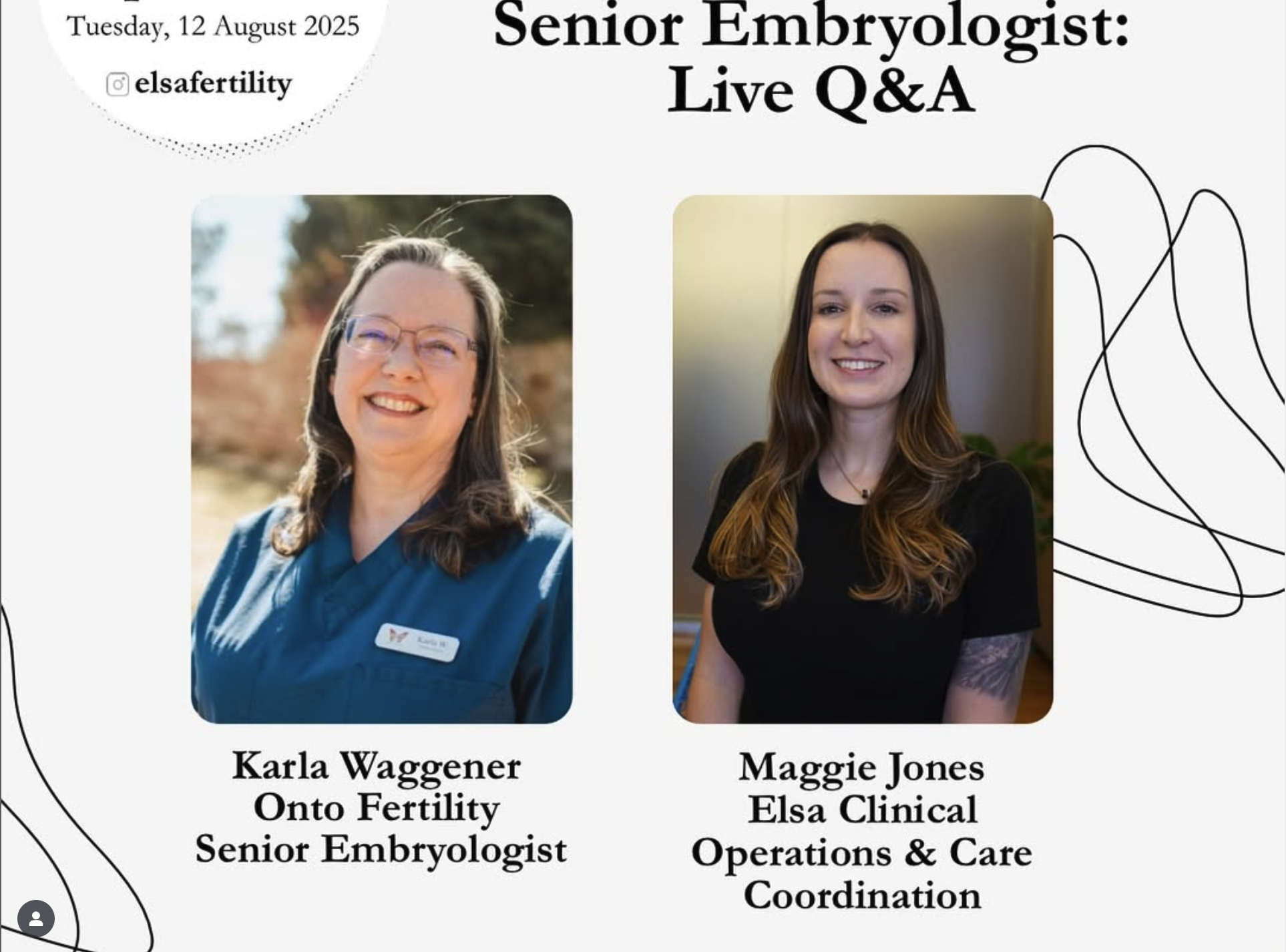Egg Freezing: A Fertility Option for People with Health Condition

For many, the decision to start a family can be a deeply personal one, often influenced by life circumstances, career goals, and relationships. However, for people facing health conditions that may impact fertility, such as cancer, autoimmune disease, or gynecologic disorders such as endometriosis, the question of when and how to have children can be more complicated. Thankfully, advances in fertility preservation, particularly egg freezing, offer a powerful solution for those in this situation.
Egg freezing allows you to take control of your reproductive future, even when health challenges threaten your ability to conceive later on. In this blog, we’ll explore how egg freezing can help those with health conditions preserve their fertility, providing hope for a family in the future, even if the timing isn't right at the moment.
What Is Egg Freezing?
Egg freezing, also known as oocyte cryopreservation, is a process that allows persons with ovaries to preserve their eggs (oocytes) at a younger age when their fertility is at its peak. The eggs are grown, retrieved from the ovaries, frozen, and stored for future use. If you have difficulty conceiving when you are ready to start building your family, the eggs can be thawed and fertilized with sperm to create embryos, which are then implanted in a uterus. Since advancing age is the most important prognostic factor impacting fertility, a significant benefit of egg freezing is that the frozen eggs maintain the reproductive potential of the age they were frozen.
This option provides flexibility for those who wish to delay starting a family, whether due to health concerns, personal reasons, or life circumstances. It allows them to focus on treatment, career, or other priorities while reducing the fear of losing the ability to have children.
Why Health Conditions or Personal Circumstances May Affect Fertility
Certain health or personal circumstances can significantly affect one’s ability to conceive. Medications and surgeries can cause damage to the ovaries, which may reduce the number of eggs, lower their quality, or impact the organs responsible for pregnancy. Some health issues are also associated with treatments that may further affect fertility.
Let’s take a look at some common examples of circumstances that might prompt you to consider egg freezing:
1. Cancer and Cancer Treatment
One of the most well-known reasons to opt for egg freezing is a cancer diagnosis. Cancer treatments, such as chemotherapy and radiation, are designed to prevent the growth of abnormal cancer cells but often cause undesired harm to other organs, including the ovaries. Chemotherapy and radiation cause damage to the genetic material within eggs, which are particularly susceptible to injury, leading to a decline in the number and quality of eggs. These effects of cancer treatments can result in early menopause and a significant reduction in the number of eggs available for fertilization.
By freezing eggs before undergoing cancer treatment, one can preserve their fertility, even if the treatments lead to infertility in the future. Frozen eggs can be used for pregnancy in the patient, or if there are medical contraindications to pregnancy, a gestational carrier may be an option. Egg freezing offers peace of mind, allowing you to focus on fighting cancer and recovering, with the option to start a family later when ready.

2. Endometriosis and Other Conditions Potentially Necessitating Ovarian Surgery
Endometriosis is a chronic condition where tissue similar to the lining of the uterus grows outside the uterus, causing pain, heavy periods, and potentially leading to infertility. While not all people with endometriosis will experience fertility problems, it can make it harder to conceive due to damage to the ovaries, scar tissue, adhesions, or blocked fallopian tubes.
People with endometriosis often require surgery to remove the endometriosis tissue, which may result in the removal of portions of the ovaries. Many other people will develop cysts or growths in their ovaries that require surgery. In these circumstances, removal of a portion or the entirety of the ovaries can have long-term consequences on fertility.
For people with endometriosis or conditions necessitating ovarian surgery, egg freezing can provide an opportunity to preserve healthy eggs for the future. In most cases, the earlier the eggs are frozen, the better the chances of obtaining enough eggs to optimize your chances of conceiving in the future.
3. Autoimmune Diseases
Certain autoimmune diseases, such as lupus or rheumatoid arthritis, can also impact fertility. Some autoimmune conditions directly affect the ovaries, while others can lead to the need for treatments like immunosuppressive drugs, which can have an impact on fertility. In these cases, freezing eggs before undergoing treatment may allow one to preserve their fertility while managing their health condition.
4. Gender-Affirming Therapies
Trans-masculine or non-binary individuals may initiate hormonal therapies, such as testosterone, or undergo surgeries to remove ovaries. While important for gender-affirming care, these treatments may impact the available number or quality of eggs if fertility is desired in the future. Egg freezing prior to initiating treatments provides additional options for family building in the future, even if they do not intend to carry a pregnancy.
How Egg Freezing Can Help People with Health Conditions
For those facing health challenges, egg freezing provides a crucial opportunity to support their ability to have children in the future. Here’s how egg freezing can be a lifeline:
1. Preserving Fertility Before Treatment
In cases of cancer or other health conditions that require treatment that may impact fertility, egg freezing allows one to preserve eggs before undergoing chemotherapy, radiation, or other medical treatments that could harm their fertility. This is the best available option to preserve fertility for the future, even if fertility is compromised by the treatment.
The process of egg growth, retrieval, and freezing is relatively short and can be initiated pretty quickly in relation to starting treatments like chemotherapy. It can result in approximately 2-3 weeks of delay in your treatment, and most research studies indicate this delay does not worsen prognosis in the case of cancers.
2. Avoiding Fertility Decline
Conditions like endometriosis or autoimmune conditions may result in gradual changes to fertility over time. By freezing eggs at a younger age, one can avoid the natural decline in egg quality that occurs as they get older. Freezing eggs when fertility is still optimal provides more control over when they have children, regardless of how their health conditions may affect fertility later on.

3. Empowering Individuals with Health Conditions
Egg freezing empowers people to make decisions about their reproductive future on their own terms. For individuals facing health challenges, knowing that they have the option to preserve their fertility can alleviate anxiety and uncertainty. It provides the opportunity to take time to focus on managing health, treatments, and other priorities, without feeling pressured by the biological clock.
4. Flexible Family Planning
With frozen eggs, you have the flexibility to choose when to start a family, regardless of the impact of health conditions. Whether it's after a successful cancer treatment, a period of remission, or a time when the health condition is more stable, egg freezing allows you to plan for parenthood in a way that suits your individual circumstances.
The Process of Egg Freezing for Individuals with Health Conditions
The process of egg freezing for people with health conditions is similar to that of individuals without medical concerns. It involves ovarian stimulation through hormone injections, egg retrieval, and cryopreservation of the eggs. However, depending on the health condition and the individual’s medical history, the process may require additional monitoring or adjustments.
It’s essential to consult with a fertility specialist to determine the best approach based on the specific health condition. The fertility specialist will work closely with the patient’s healthcare team to ensure that any medical treatments or concerns are addressed during the egg freezing process.
Conclusion: A Path to Hope and Possibility
Egg freezing offers options and hope for those with health conditions that might otherwise threaten their fertility. Whether facing cancer treatment, chronic conditions like endometriosis, or other challenges that may impact fertility, freezing eggs allows you to preserve fertility and take control of your reproductive future. By understanding how egg freezing works and how it can help in the face of health issues, people can make informed decisions and pursue their dreams of having children when the time is right for them.

Articles Recommended for You
Modern, personalized, effortless
Join our mailing list to stay informed with the latest in fertility.




